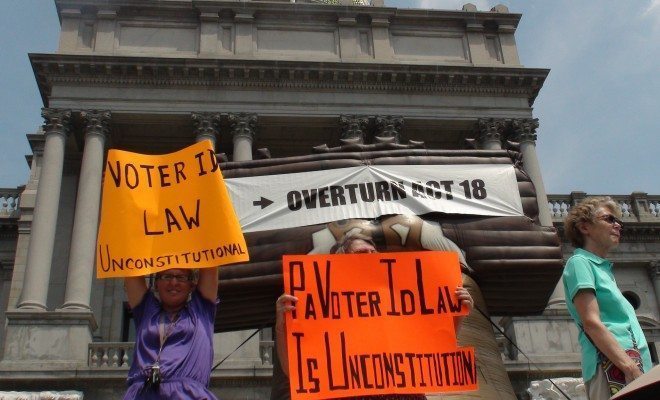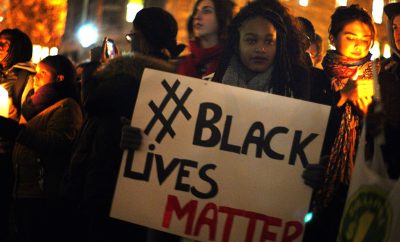 Image courtesy of [Rick Smith via Flickr]
Image courtesy of [Rick Smith via Flickr]
Law
Voter ID Laws: Are They Necessary?
The passage of voter identification laws has been a popular political fire-starter in recent years. At their core they make sense–you should have to be who you say you are in order to vote. But in practice there are significantly more nuances, problems, and historical concerns that accompany voter ID laws. Read on to learn about the complicated arguments over voter ID laws.
What is a Voter ID Law?
At its core it’s pretty much exactly what it sounds like–a law requiring that photo identification is shown before a citizen votes. It is used to confirm that the person voting is who she says she is, and that she is in fact registered to vote. Voter ID laws have taken a few different forms in the United States. The National Conference of State Legislatures delineated several different categories of these laws.
Strict voter ID laws that require photo ID: At least seven states have strict voter ID laws that require photo identification in 2014, including Georgia, Indiana, Kansas, Mississippi, Tennessee, Texas, and Virginia. This type of law require that a voter show some sort of government-issued photo ID, usually from a list of acceptable options provided by the state. These laws also usually allow a voter who doesn’t have an approved form of identification to cast a provisional ballot, but require the voter to take extra steps after the ballot has been cast, such as return with an ID a few days later.
Strict voter ID laws that don’t require photo ID: At least three states have strict voter ID laws not requiring photo identification in 2014, including Arizona, North Dakota, and Ohio. Although these laws don’t require a voter to show photo identification, they do require an approved ID of some sort, such as proof of address or a birth certificate. Again, these lists are curated by the states themselves; however, if that form of identification is not provided, a voter in these states would have to return with it at some point.
Less-strict voter ID laws that require photo ID: At least eight states have this level of photo ID at the polls in 2014, including Alabama, Florida, Hawaii, Idaho, Louisiana, Michigan, Rhode Island, and South Dakota. While states in this category do require photo ID, there are ways around showing it. For example, some states allow a voter to sign an affidavit proving his identity, or to send a letter confirming who he is.
Less-strict voter ID laws that don’t require photo ID: At least 13 states have this level of photo ID at the polls in 2014, including Alaska, Arkansas, Colorado, Connecticut, Delaware, Kentucky, Missouri, Montana, New Hampshire, Oklahoma, South Carolina, Utah, and Washington. Voters are required to bring some form of non-photo identification; however, if they don’t they can still vote by signing an affidavit attesting to their identities.
No ID law at all: At least 17 states do not require ID to vote, including California, Illinois, Iowa, Maine, Maryland, Massachusetts, Minnesota, Nebraska, Nevada, New Jersey, New Mexico, New York, Oregon, Pennsylvania, Vermont, West Virginia, and Wyoming. Some of these states, however, have enacted or are working to enact voter ID laws for future elections.
Voter ID laws are now in 17 more states than they were in 2000. http://t.co/HaPbgUZnnz pic.twitter.com/jop0rVD8Qz
— FiveThirtyEight (@FiveThirtyEight) November 1, 2014
What is the argument for voter ID laws?
The Rock the Vote campaigns have lost a little bit of their edge as voter identification laws are increasingly enacted across the country. Supporters of voter ID laws argue that certain measures of identification are necessary to prevent voter fraud and ensure the sanctity of the election process. They also argue that requiring a government-issued ID in order to cast a ballot is not too much too ask, as everyone has some sort of government identification on his or her person at all times.
Voter ID laws have traditionally received support from conservative politicians. As Mitt Romney put it in 2011:
I find it extraordinary that [US Attorney General] Eric Holder is, one more time, making a very serious error [in challenging a South Carolina law that requires a photo ID to vote]… The idea that people should not be able to be identified as they vote so that we can know that they are not voting multiple times. I mean, that’s the purpose here of course. We don’t want people voting multiple times and you can get a photo ID free from your state. You can get it at the time you register to vote…That’s one more lawsuit I’d end if I were president of the United States.
What’s the argument against voter ID laws?
Those against the bill argue that voter ID laws prevent college students from going to the polls and therefore suppress youth voting, which is already an issue that many organizations work to combat. College students and other young people often don’t have government-issued photo IDs that contain their current addresses, because their permanent residence is often different from where they live during college. There are also allegations that these laws are passed merely for the sake of being passed. Some of the most controversial provisions of the bills seem to be included without much thought and even go unread by those signing them into law.
Some elected officials argue that voter ID laws prevent minority and elderly voters who lack the means to comply with them. Others argue that the laws are American conservatives’ means to subtly discriminate against minority voters. The Brennan Center for Justice estimates that as much as seven percent of Americans don’t have proof of citizenship, and as much as 11 percent don’t have a government-issued photo ID. The reasons for this are myriad–the Brennan Center points out that married women disproportionately don’t have anything to prove their citizenship, because they’ve changed their last names. In addition, the elderly, the poor, and those who don’t have the funds to drive are unlikely to have government-issued photo ID.
Conclusion
In a political landscape that can only possibly be described as polarized, who can vote in an election is certainly at issue. While the idea of voter ID laws makes sense in theory, there are certainly valid questions as to the actual functionality of the laws. It is as much a political issue as an ethical one–it will be interesting to see which of those two competing interests ends up winning out.
Resources
Primary
US House of Representatives: House Bill 589 – Voter Information Verification Act
Additional
Guardian: Felon Voting Rights Have Bigger Impact Than Voter ID Laws
The New York Times: States Rush to Enact Voting Laws
The New York Times: Supreme Court Invalidates Key Part of Voting Rights Act
CNN: Civil Rights Struggle Far From Over
Philly: Voter ID’s Fate Now In Judge’s Hands
Brennan Center: Citizens Without Proof








Comments